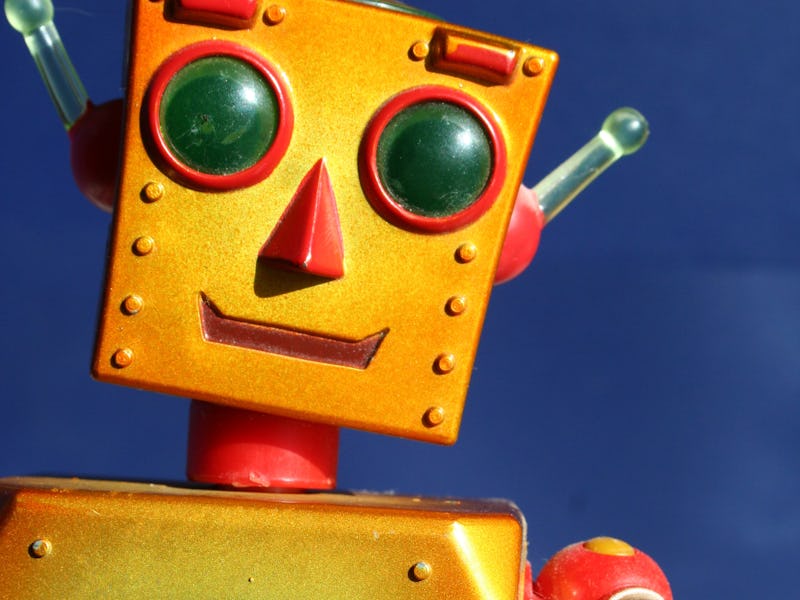A.I. Powered Civil Servants Could Take Over the Government
It may happen sooner rather than later.

Until robots reach some kind of full consciousness, nobody feels bad about not paying them. That’s why austerity-focused governments are on a collision course with replacing civil servants with automated workers to cut costs: We’re talking robo-cops, robo-firefighters, robo-mailmen. If artificial intelligence gets good enough to take private-sector jobs, there’s little to stop it from driving a technological revolution that could leave government services unrecognizable.
For the past six years, the British Conservative Party has been pursuing an austerity program to cut the deficit, slashing funds for local services and reducing staff numbers in the public sector. A recent report, published in October by Oxford University and Deloitte, suggests the government could go much further: over 850,000 public sector jobs could be lost to automation by the year 2030.
The report sparked outrage. “I started my career in local government and I loved it so I was shocked by the idea that the job I was so passionate about could be done by a robot,” public sector worker Inara Khan told The Guardian. “You might trust a robot to vacuum your house while you’re out, but would you trust one to pick up early signs of mental health problems, or to have a conversation with an elderly person who hasn’t spoken to anyone else that day?”
Human touch or otherwise, there’s some big savings up for grabs. In Deloitte’s State of the State 2016/17 report, academics Carl Frey and Michael Osborne helped identify two categories of workers: those in behind-the-scenes administrative positions are at highest risk of robot takeover, while those that require interacting with the public could benefit from A.I. enhancements. The report predicts that, compared to 2015 figures, automation could bring 17 billion ($21.2 billion) in savings to the public sector paybill by 2030.
“I think these kinds of prediction are fallible to say the least,” David Spencer, a professor of political economy at the University of Leeds, tells Inverse. “Will there be robot police officers by 2030? Maybe. But we seem a long way from that outcome.”
For Spencer, the issue is that reports like Deloitte’s focus on automation as something that will destroy jobs, rather than a complement to existing roles. Take the police officer. They carry out a range of jobs in their daily routine, and some of them, like filling in paperwork, seem ripe for automation by robo-cops. Others, like arresting people, may survive these technological changes, as the public is unlikely to trust a robot wheeling around catching criminals. Similarly, kids probably won’t take kindly to being taught by a robot teacher, even if Saturday morning cartoons suggest otherwise.
Philip Hammond speaking to the House of Commons on Wednesday.
Britain’s vote to withdraw from the European Union will mean public sector savings will be needed now more than ever. Originally, the government had planned to eliminate the deficit before the 2020 election. In Wednesday’s “autumn statement,” chancellor Philip Hammond delivered the regularly scheduled update on the state of the economy, with bad news — June’s Brexit vote cut economic growth forecasts, and before the 2020 election, the government will borrow £122 billion ($152.1 billion) more than previously thought. The potential to save billions in expenditure will make automation a tantalizing prospect.
Automation has already crept into the public sector in small ways. New online voter registration systems have slashed paperwork, while the Gov.uk website has consolidated a number of previously disparate online services into a more accessible interface, encouraging more citizens to make the switch. Deloitte points to the Docklands Light Railway (DLR), an automated train network serving east London, as an example of how physical operative roles could be automated.
“While most administrative tasks such as filling in forms are now done online, frontline housing staff who help residents to fill out forms do so because they often deal with vulnerable people who need sensitivity,” Khan said. “Show me a robot who can do that with genuine warmth and compassion.”
Still, there are ways that automation could positively impact those who need help from the state. Joshua Browder, a student at Stanford University, has created DoNotPay, an A.I. chatbot that helps people understand their rights and apply for housing assistance. In these situations, automation is replacing fallible humans with computers able to draw on a compendium of knowledge.
It’s hard to know how this revolution will play out. Time will tell whether we end up with benevolent machines able to get people the support they need, or cold boxes incapable of understanding why someone is sad or angry. But Brexit has created an urgency around cost-saving measures, and sooner or later, one of these will have to become reality.